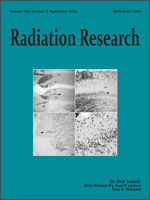Cranial irradiation is a critical and effective treatment for primary brain tumors and metastases. Unfortunately, most patients who are treated and survive for more than a few months develop neural and cognitive problems as the result of radiation-induced normal tissue injury. The neurobiological mechanisms underlying these cognitive deficits remain largely unknown and there are no validated treatments to prevent or ameliorate them; thus, there is a significant and continuing need for preclinical studies in animal models. Investigations from several laboratories have demonstrated neurobiological changes after cranial irradiation in rodents. To date, however, experimental studies in animal models have included little assessment of the systemic effects of cranial irradiation, despite evidence from the clinic that cranial irradiation results in changes throughout the body and recognition that systemic responses may influence the development of neural and cognitive deficits. This study evaluated systemic effects of clinically relevant, fractionated whole-brain irradiation in adult rats and demonstrates effects on the growth hormone/insulin-like growth factor-I axis, which may contribute to the development of neural changes. These and other systemic responses are important to consider in ongoing efforts to understand the mechanisms of radiation-induced normal tissue injury.
How to translate text using browser tools
16 August 2013
Systemic Effects of Fractionated, Whole-Brain Irradiation in Young Adult and Aging Rats
M. E. Forbes,
M. Paitsel,
J. D. Bourland,
D. R. Riddle
ACCESS THE FULL ARTICLE
<
Previous Article
|

Radiation Research
Vol. 180 • No. 3
September 2013
Vol. 180 • No. 3
September 2013




